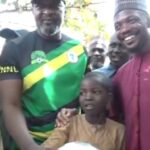
The recent spate of killings in Plateau State and especially the Christmas eve bloodshed that left several people dead points not only as ugly evidence to the fragility of peace in the once peaceful state and by extension the country as a whole but, more critically, is a clear indictment of governance failures at all levels.
Plateau State has tragically become a recurring scene of bloodshed and despair. The loss of lives, displacement of communities, and the deepening ethnic and religious fault lines underscore a systemic breakdown in the very fabric of governance.
Media reports had it that the attack on about 28 communities in Mangu, Bokkos and Barkin Ladi Local Council Areas of the State left over 185 innocent people killed in their sleep by heartless invaders while about 221 houses were burnt down and more than 10,000 persons currently displaced. The mayhem unleashed on the affected peaceful rural communities is the worst according to reports since 2018.
It is even more regrettable that the attack according to reliable community sources was said to have been carried out even when notice of the impending disaster was announced through a letter dated November, 15 and sent to the communities by the perpetrators of the dastardly act. The question that readily comes to mind is: what did government at various cadre do to protect the lives and properties of the vulnerable communities?
Could these barbaric acts not have been stopped if leadership at all levels were responsible and proactive? According to His Eminence the Sultan of Sokoto, Alhaji Abubakar Sa’ad III, “Why can’t we be proactive and stop such attacks before they happen?” The Sultan as a retired Colonel in the Nigerian Army is well positioned to ask such a question knowing the place of intelligence in crime prevention.
The ongoing tragedy on Plateau State is not just a consequence of isolated incidents but a manifestation of the collective failure of leadership, accountability, and the responsibility to protect citizens, ultimately pointing to the urgent need for a radical reassessment of governance structures and security architecture.
The history of killings and bloodbath in Plateau State, is deeply rooted in a complex interplay of ethnic, religious, and socio-economic factors. The state, situated in the North Central region of Nigeria, has experienced cycles of violence that have claimed numerous lives and led to the displacement of communities. The conflicts are often characterised by clashes between various ethnic and religious groups, primarily the Berom, Fulani, and Hausa, as well as Christian and Muslim communities.
Once celebrated for its ability to harmonise the coexistence of diverse ethnic and religious communities, the recent outbreaks of violence in Plateau State reveal a failure in the basic duty of the government to ensure peace and security. The escalation of conflicts and the inability to prevent recurrent clashes indicate a lack of effective peace-building strategies and crisis management.
Causes of escalating violence in Plateau State are diverse and difficult to narrow down to a particular factor. Plateau State is a diverse region with a mix of Christians and Muslims, as well as various ethnic groups. The intersection of religious and ethnic identities has played a significant role in the conflicts, with tensions often escalating along these fault lines. Places of worship, homes, and entire communities have been targeted based on religious and ethnic affiliations.
One other major reason for violence in Plateau State is related to disputes over land and resources. Competing claims for fertile land, grazing areas for cattle, and access to water sources have fueled longstanding conflicts between indigenous farming communities and nomadic pastoralists.
The effectiveness of the security response to the conflicts has often been questioned. Critics argue that security forces have sometimes been ill-equipped or slow to respond, allowing violence to escalate. In some cases, allegations of bias and complicity have further eroded trust in security institutions.
While responding to the recent attack on communities in his domain and leading to lost of lives, the governor of Plateau State, Caleb Mutfwang frowned at the incident and condemned the attacks vowing to bring the perpetrators to book. He however linked the recent Christmas attacks to criminality while describing the perpetrators as dare devils in human flesh.
In his words: “This has indeed been a very gory Christmas for us. We have had to celebrate with a heavy heart. Just when people had finished preparing for Christmas celebrations, unprovoked attacks were unleashed on several of our communities. As I am talking to you, in Mangu Local Government alone, we buried at least 15 people. So far this morning in the Bokkos Local Government, we were counting not less than 100 corpses. I have yet to take stock of that of Barkin Ladi. Most of the communities affected in Barkin Ladi share a border with the Bokkos Local Government.”
In an emotion laden voice, the Governor further lamented that no fewer than 64 communities in the state had been displaced by terrorists who were occupying schools in the local government area.
“As I am talking to you, in the Riyom and Barkin Ladi Local Governments, schools have been occupied by these terrorists for almost a number of years now. We have not less than 64 communities that have been displaced and their lands have been taken over by these terrorists.”
The persistent violence in Plateau state and by extension the country as a whole brings to the fore the question of the effectiveness of the security architecture in the country and raises concerns about the adequacy of intelligence gathering, the responsiveness of law enforcement agencies, and the capacity to quell violence swiftly.
To be continued tomorrow
Okoronkwo, a leadership and good governance advocate wrote from Lagos and can be reached on kalu.okoronkwo@gmail.com













